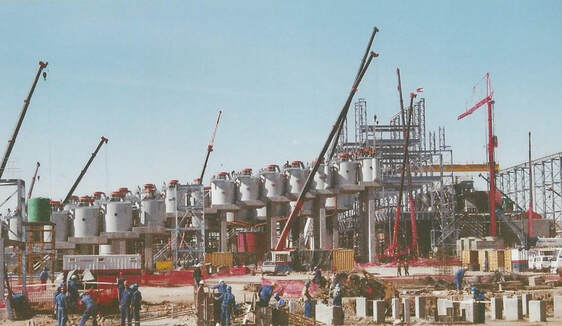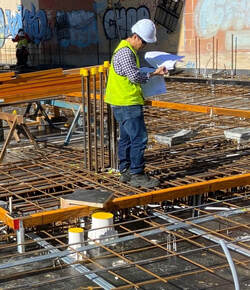"Are you training the next generation of construction project managers?" Are you training your Project Managers (construction managers, site managers, site agents)?Many construction projects fail due to poor project management. Contractors are continually bemoaning the fact that they can’t get good people anymore. But what are these contractors doing about it? They seem to think they can simply approach a recruitment agency, or advertise, and they’ll have ‘ready-made’ experienced and skilled construction project managers wanting to work for them whenever they’re required. Yes, there are some excellent project managers, but the chances of one of them knocking at your door when you need them are slim. Unfortunately there are also plenty of poor project managers and some of these may knock on your door. Employing the right people in construction So what can contractors do about the skills shortage – or are they just going to whinge and blame the lack of skills for poor performance, without actually doing anything positive to rectify the situation? My journey to becoming a construction project manager – and going furtherI was fortunate that as a newly qualified civil engineer I applied for several jobs and most companies offered me a job – so I had choices. I selected what I saw as a growing contractor that executed projects I was interested in. They had recently been awarded a large civil construction project where they needed me, so I thought it would be good experience. Oh, and of course the pay was better than most of the others. But I made a fortunate choice. There I was almost first on the ground on a big construction project, but completely green with no construction experience, initially working with the surveyor, then looking after the soils and concrete testing laboratory. Getting involved with running the concrete mixing plant and helping schedule and organise large concrete pours. While all around me the project grew. Earthworks, then concrete structures, some building work, eventually the mechanical and electrical contractors moved onto the project (these weren’t in our scope, but I still watched and took note) and finally the roads around the completed facility. What a great experience to witness. I was always asking questions, asking for more work. I was even given boring stuff like checking the cost ledger – boring but essential grounding that helped me understand how important it was to check and understand the project’s costs. After six months I was given my own section to manage which was several kilometres from the main construction project. There I learned about formwork, scheduling (programming), ordering materials, planning the project and overcoming the normal obstacles that occur every day on construction projects. Yet fortunate enough that experienced project managers were close at hand watching my every move, but seldom interfering unless I was desperate for help. Twelve months later I was given my own small construction projects to manage. A couple of Supervisors and I managed the project. I planned the project from scratch, sourced the construction equipment, ordered the construction materials and appointed the subcontractors. Every month I measured the completed work and submitted monthly valuation claims. There was additional scope I had to price, so I learned the basics of pricing construction work. In those days we did our pricing long-hand. We broke everything down into labour, materials, equipment and subcontractors. On the blank page on the left-hand side of the bill of quantities we did our calculations. (Pencil, paper and a calculator – sorry showing my age here, but sometimes long-hand is good as it shows you the basics!) In many ways I was lucky and only saw my first planner on my project in my fifth year in construction – before that I did the scheduling. In the first six years I did all my own measuring, the cost reports and variation claims. We didn’t have safety officers and quality control managers so we did all the paperwork ourselves – granted only half what’s expected now. But what great all-round experience – experience that’s stood me in good stead today. In all of this I was fortunate to work with many great supervisors and foremen who passed some of their experience and knowledge to me. My managers and directors were generally experienced, knowledgeable and helpful. I learned from all of them – including sometimes what not to do. This is my story Paul Netscher "I was fortunate to work with many great supervisors and foremen who passed some of their experience and knowledge to me." Recruiting the next generation of construction project managersUnfortunately many young graduate engineers and project managers can’t even get their first job – why – because they don’t have experience! Some contractors view them as unemployable. When I managed my own construction division I saw it as a tragedy that many young construction graduates couldn’t find work. In fact there were some courses that required students to complete six or twelve months of practical experience with a company before they would be granted their qualification. These poor students couldn’t even complete their qualifications because construction companies wouldn’t employ them. I employed many of them. They were relatively cheap and provided useful help on our construction projects. But more importantly, at the end of the specified period they had received valuable construction experience with a reputable construction company where they learned the basics well, and of course they could finally obtain their degree, or diploma, and continue with their career. But, there was another benefit for us – at the end of the year we were able to select the best and employ them as qualified engineers. We had a year to understand them, and they had a year to decide if they enjoyed working with us. Surely a win-win for both parties with a better chance of success than employing someone we didn’t know. The other benefit was that most of these young newly qualified engineers became incredibly loyal to the company because we had helped them gain their qualifications – we had extended a lifeline to their career. Most became successful and the company benefited hugely from their experience and skills – experience we had provided. What happens today? "You don't always need the most experienced person, just someone diligent and willing to learn." How contractors sabotage the next generation of project managersI’ve seen young engineers unable to get a job, become disillusioned and leave the industry before they started. Others in desperation join construction as a labourer or work themselves up through the trades. When contractors do employ young engineers they are sometimes put in a pigeon hole, only good to do quality inspections for a couple of years, or manage the laboratory or the concrete mixing plant. Then when the contractor needs a project manager they take one of these engineers, or a Supervisor, or someone in another role, and appoint them as the project manager. Yet these individuals have no experience in managing a project! Many contractors operate with specialists, who only do planning, or quality control, or safety, or claims and measurement. When someone finally makes it to become a project manager, site manager or site agent, they rely on these specialists. But often, the construction project managers don’t understand the basics of what these people do, so they aren’t capable of interrogating a construction schedule, or checking that the safety officers or quantity surveyor is doing their job properly. They don’t understand how to prepare a construction schedule, can’t measure the completed work, they often don’t understand cost reports, can’t price a construction project, can’t interpret the contract document, don’t understand the basics and unfortunately can’t plan the construction project. (planning your construction project) Then when things go wrong on their project their bosses or managers blame them. The sad thing is that some of those same managers don’t know any better themselves, and are incapable of correcting them or offering advice when things start going wrong because they were never trained properly. "Careers can be destroyed when inexperienced project managers are put in charge of complex construction projects without support.." I’ve seen project manager’s careers destroyed before they even started because they were put in charge of a project and didn’t have the experience or knowledge required and weren't supported when they got into trouble. So what should contractors do to improve the skills shortage? How contractors can improve the skills shortageWell firstly let’s employ newly qualified engineers and project managers, even if they don’t have experience. Don’t pigeon-hole them in one position for years – even if they’re doing well in that position. Give them a variety of experience. Ensure they are exposed to:
"A good mentor is invaluable." Allocate a mentor to them. Ensure your team understands how important it is to help and correct them. Send them on training courses where necessary (unfortunately many of our universities and technical colleges don’t provide some of the knowledge we require from our future project managers) – these may include communication, letter writing, scheduling, form-work design and the contractual and financial aspects of construction. Training and mentoring in construction When they’re finally given their own project to manage ensure they are ready, then support and guide them when required. Don’t let them drown and then blame them for being a poor project manager. If they were bad they shouldn’t have been put in charge of the project in the first place. Their success is your responsibility. The importance of effective delegation for successful projects What should our young engineers and future project managers do? Advice for our prospective construction project managersUnfortunately there are some that think it’s easy and there’s a quick path to become a construction project manager. A university degree doesn’t make you a project manager, and nor does years working your way up through the trades. Read my post: ‘What does it take to manage a construction project’. Try and work for a construction company that will give you the right experience. Importantly work for the right manager who can mentor you, passing their knowledge to you. Continually ask questions. Understand the construction processes. Get involved with different aspects of construction and the various management processes, so you gain as much experience and knowledge as possible. Don’t think it’s easy to manage a construction project. What qualities does a good construction project manager require? "Learn from the experts and continue learning." Train the next generation of construction project managersMy mission has always been to train those working with me so they can be better than I was. I made mistakes – they shouldn’t make the same mistakes as me! That’s why I’ve written several books in the hope of passing on my knowledge and experience to the next generation. Let’s stop blaming the skills shortage for the poor performance of some project managers. Ensure we are training the next generation of construction project managers so they’ll be better than us. Take the time to mentor our young engineers and project managers. Correct them when they make mistakes, give them advice, help them and delegate responsibility to them. Yes, there will be failures and some that won’t make the grade, but with proper support and encouragement there will be many more successes. The future of our construction projects is in your hands. #constructionmanagement #constructionprojectmanagement #construction To read more about the author’s books and find out where you can purchase them visit the pages on this website by clicking the links below:
'Successful Construction Project Management: The Practical Guide' 'Building a Successful Construction Company: The Practical Guide' 'Construction Book reviews' To read more about the author visit the page 'Paul Netscher' Want to contact Paul Netscher please enter your details on 'Contacts' Find out how Paul Netscher can help you Order your books from Amazon Order your books from Amazon UK © 2016 This article is not to be reproduced for commercial purposes without written permission from the author. construction management construction project management
0 Comments
Leave a Reply. |
Archives
June 2024
Note: We welcome genuine comments, especially comments that add additional information to the subject matter in the article. We however reserve the right to remove inappropriate comments, which includes comments that have nothing to do with the subject, comments that include inappropriate language, and comments that are an advertisement for a product or company, or which include an advertising link. Comments must be in English. We will not enter into discussion on why a particular comment was removed.
CategoriesCopyright 2016 - The attached articles cannot be reproduced for commercial purposes without the consent of the author.
The opinions expressed in the attached articles are those of the writer. It should be noted that projects are varied and different laws and restrictions apply which depend on the location of the contractor and the project. It's important that the reader uses the supplied information taking cognisance of their particular circumstances. The writer assumes no responsibility or liability for any loss of any kind arising from the reader using the information or advice contained herein. "I have what I consider some of the best books on construction management."
Books are available from: Amazon.com Amazon.co.uk takealot.com kalahari.com Amazon.in Amazon.de Amazon.fr Amazon.it Amazon.com.au Powell's Fishpond uread bokus Amazon.ca Amazon.es Other retail stores Available in paperback or on Kindle "28 YEARS OF CONSTRUCTION PROJECT MANAGEMENT EXPERIENCE, DEVELOPING SUCCESSFUL CONSTRUCTION PROJECT MANAGERS AND BUILDING SUCCESSFUL CONSTRUCTION COMPANIES"
|













 RSS Feed
RSS Feed




